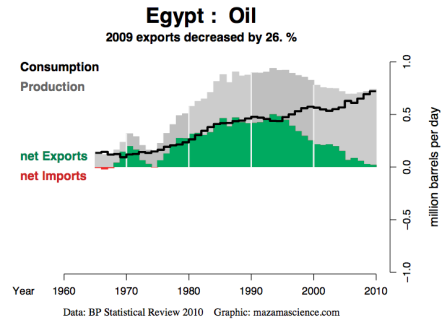We have all been reading about Egypt in the newspapers, and wonder what is behind their problems. Let me offer a few insights.
At least part of Egypt’s problem is the fact that in the past the government has threatenedto reduce food subsidies. Now it is planning to hold food subsidies level and raise energy subsidies, but it is not clear that the dollar amount of subsidy will be enough. The government is taking steps to make food and energy affordable for most, but there is worry that the steps being taken will not be enough.
Egypt’s Declining Financial Situation
Advertisement
There is a good reason why one might expect Egypt to start running into problems with energy and food subsidies. Its own financial situation is declining at the same time that the cost of food imports is soaring. If we look at a graph of Egyptian oil imports, exports, and consumption (using a graph from Energy Export Databrowser, which graphs BP Statistical Data), we find that Egypt’s oil use has been rising rapidly, at the same time the amount extracted each year is declining.
-

Figure 1. Egypt’s oil production, consumption, and exports
Starting about 2010 or 2011, Egypt will change from an oil exporting nation to an oil importing nation, if there are imports available on the world market. The catch is that Egypt isn’t the only one with declining oil production–world oil production has been approximately flat since 2005, and the countries that produce the oil are using more and more of it themselves. The result is that there is less oil available for export, even as countries like Egypt need more.
The oil that Egypt exports provides funds for the subsidies that it offers, so reduced exports mean less funds are available for subsidies. Egypt has recently been able to ramp up natural gas exports, and these exports have allowed subsidies to remain in place.

Figure 2. Egypt's natural gas production, consumption, and exports
If a person looks closely at the green portion of the graph, natural gas exports have been fairly flat since 2005. It sounds like they can be expected to remain relatively flat, too, because according to the US Energy Information Administration:
Advertisement
Given increasing domestic demand, combined with popular pressures in recent years against LNG and gas export contracts (particularly with Israel), the oil minister declared in mid-2008 that no new gas export contracts would be made.
So Egypt is still getting some export revenue from hydrocarbons, (and just as importantly, tax revenue related to the export revenue), but the natural gas amount is likely close to flat, and the amount from oil exports has gone to zero. Egypt subsidizes both oil and natural gas sales internally, so it is likely that the government is not getting much revenue related to be portion that is used for internal consumption. In fact, it may very well be a net loser on the part that is used internally because of its subsidies–revenue on exports is supposed to make up the difference. If Egypt needs to actually purchase oil from abroad in the future, its expenses can be expected to go up significantly.
Other Budget Pressures
Discuss in our Forums
See what other readers are saying about this article!
Click here to read & post comments.
31 posts so far.